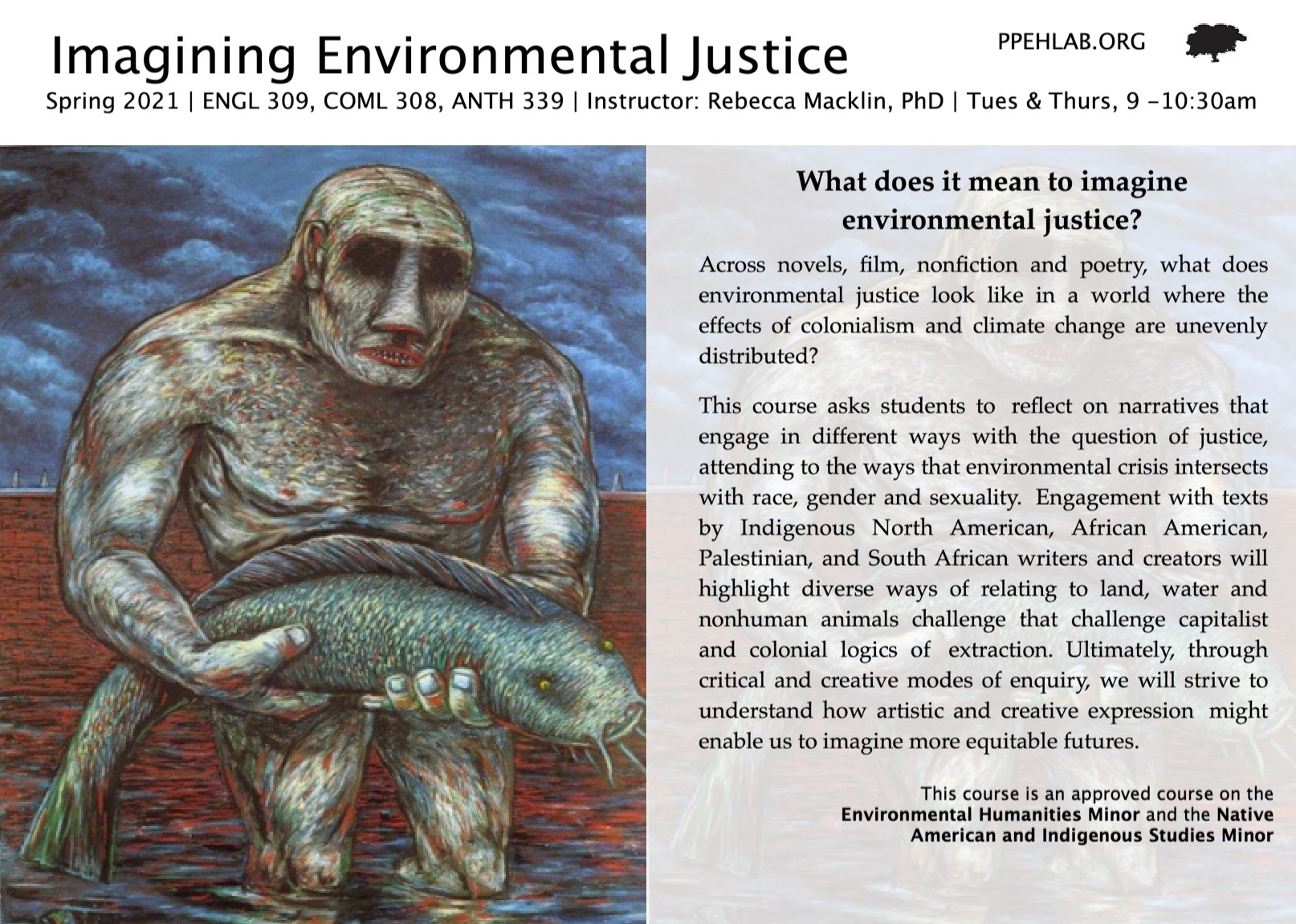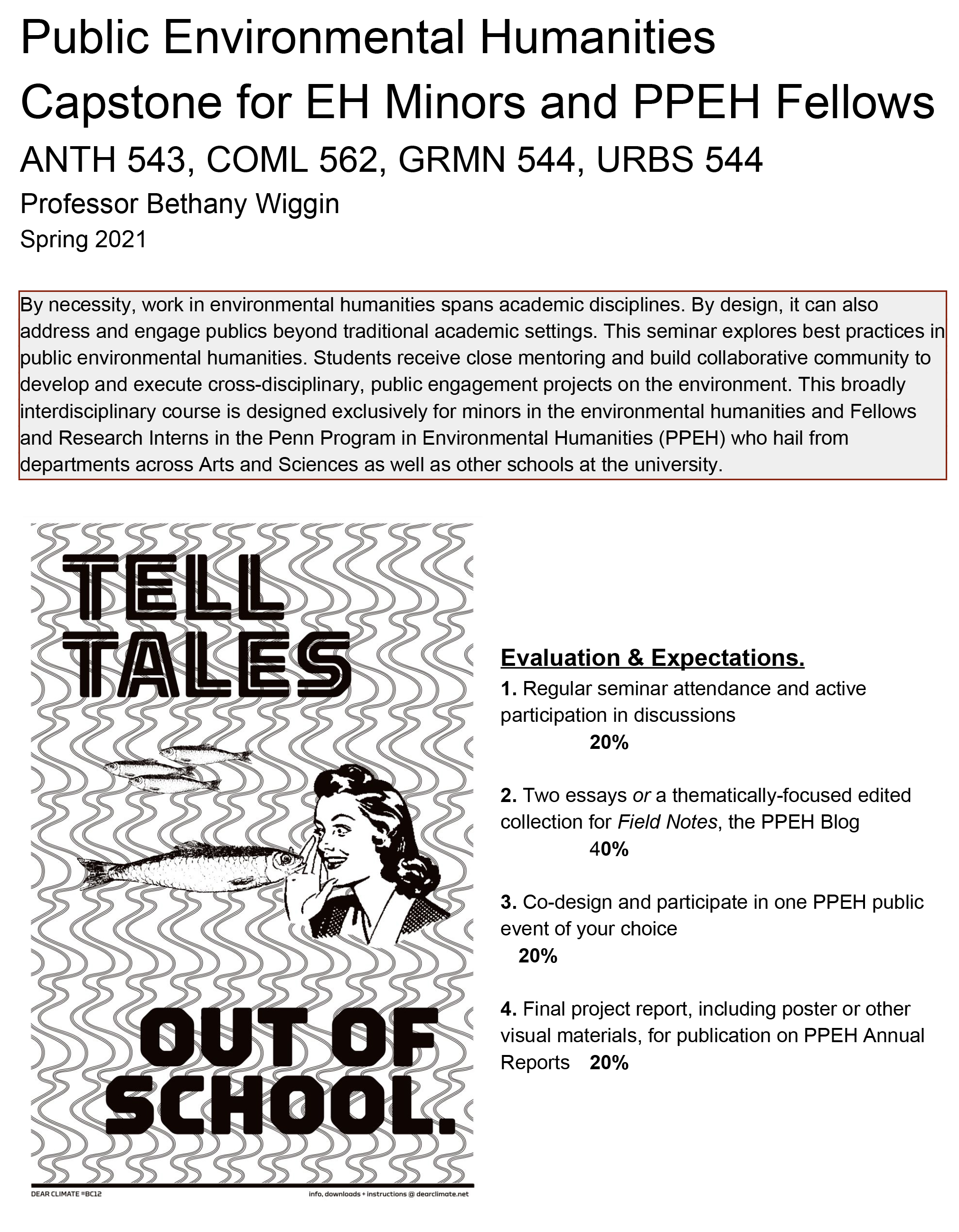Spring 2021
PHYS 016
Gary Bernstein
Tuesday/Thursday 1:30-3:00PM
The developed world's dependence on fossil fuels for energy production has extremely undesirable economic, environmental, and political consequences, and is likely to be mankind's greatest challenge in the 21st century. We describe the physical principles of energy, its production and consumption, and environmental consequences, including the greenhouse effect. We will examine a number of alternative modes of energy generation - fossil fuels, biomass, wind, solar, hydro, and nuclear - and study the physical and technological aspects of each, and their societal, environmental and economic impacts over the construction and operational lifetimes. No previous study of physics is assumed. Prerequisites: Algebra and Trigonometry. Target audience: Non-science majors (although science/engineering students are welcome).
Spring 2021
ENGL 309, COML 308, ANTH 339
Rebecca Macklin
Tuesday / Thursday, 9:00 - 10:30am
Across novels, film, nonfiction and poetry, what does environmental justice look like in a world where the effects of colonialism and climate change are unevenly distributed?
This course asks students to reflect on narratives that engage in different ways with the question of justice, attending to the ways that environmental crisis intersects with race, gender and sexuality. Engagement with texts by Indigenous North American, African American, Palestinian, and South African writers and creators will highlight diverse ways of relating to land, water and nonhuman animals challenge that challenge capitalist and colonial logics of extraction. Ultimately, through critical and creative modes of enquiry, we will strive to understand how artistic and creative expression might enable us to imagine more equitable futures.
This course is an approved course on the Environmental Humanities Minor and the Native American and Indigenous Studies Minor.

Spring 2021
CPLN 631-001
Thomas Daniels
Tuesday / Thursday, 6:30-8:00pm
An introduction to the tools and methods for preserving private lands by federal, state, and local government agencies and private non-profit organizations. Topics include purchase and donation of development rights (also known as conservation easements), transfer of development rights, land acquisition, limited development, and the preservation of urban greenways, trails, and parks. Preservation examples include: open space and scenic areas, farmland, forestland, battlefields, and natural areas.
This course fulfills the Social Sciences requirement of the EH minor.
Spring 2021
GRMN 151-401, CIMS 152-401, COML 154-401, ENVS 151-401
Simon Richter
Tuesday / Thursday 7:00-8:30pm
The destruction of the world’s forests through wild fires, deforestation, and global heating threatens planetary bio-diversity and may even, as a 2020 shows, trigger civilizational collapse. Can the humanities help us think differently about the forest? At the same time that forests of the world are in crisis, the “rights of nature” movement is making progress in forcing courts to acknowledge the legal “personhood” of forests and other ecosystems. The stories that humans have told and continue to tell about forests are a source for the imaginative and cultural content of that claim. At a time when humans seem unable to curb the destructive practices that place themselves, biodiversity, and forests at risk, the humanities give us access to a record of the complex inter-relationship between forests and humanity. Forest Worlds serves as an introduction to the environmental humanities. The environmental humanities offer a perspective on the climate emergency and the human dimension of climate change that are typically not part of the study of climate science or climate policy. Students receive instruction in the methods of the humanities—cultural analysis and interpretation of literature and film—in relation to texts that illuminate patterns of human behavior, thought, and affect with regard to living in and with nature.
Spring 2021
ARCH 718
Daniel Barber
Wednesday 9:00am-12:00pm
This course discusses the history of thinking about climate in architecture. We confront the geographic and epistemic challenges of climate change and other environmental threats, and reconsider the forces seen to condition the development of the field. We elaborate narrative for the field that focuses on architecture as a device for climatic adaptability. As many of the arguments and innovations in the climate discourse were made through visual means, the images produced by architects will also be a central arena of exploration, in the context of other environmental-mediatic practices. This is a small lecture course, required for students in the Master of Environmental Building Design, undergrads and grads are welcome.
This course fulfills the humanities requirement for the minor.
Spring 2021
ARTH 577/ ARCH 411/711
Daniel Barber
Thursday 1:30-4:30pm
This seminar will address the diverse narratives of ecological thinking in the history of art, architecture, and urban planning during the 20th century. The course will contextualize and interrogate contemporary disciplinary discourses as well as historical assumptions related to ecological thinking in art and architectural history and environmentally-conscious practices. By mapping received trajectories of Eco Art, Ecocritical Art History, and Ecological Histories of Architecture and Urban Planning, the course will work from a subtly hidden foundation of eco-historical knowledge that connects these fields of inquiry, while also critiquing these trajectories and seeking to provide more focused and robust alternatives for knowledge production in the present. It aims to attract students from the School of Arts and Sciences and the Weitzman School of Design in a discussion on the interconnected histories of art and architecture during the 20th century.
This course fulfills the humanities requirement for the minor.
Spring 2021
BEPP/OIDD 763
Arthur van Benthem
Tuesday / Thursday 3:00-4:20pm
BEPP/OIDD 763 (Energy Markets and Policy) teaches you how to think about energy markets – ranging from fossil fuels to renewable energy to cap-and-trade systems – from an economist’s perspective and how regulation impacts important large-scale investment decisions in the energy space.
This course fulfills the social science requirement for the minor.
Spring 2021
BEPP/OIDD 263
Arthur van Benthem
Tuesday / Thursday 12:00-1:20pm
BEPP/OIDD 263 (Environmental & Energy Economics and Policy) examines environmental and energy markets from an economist’s perspective, ranging from fossil fuels to renewable energy to cap-and-trade systems, and explains how different regulations can provide efficient or counter-productive incentives for firms, consumers and politicians.
This course fulfills the social science requirement for the minor.
Spring 2021
GRMN 544-401, ANTH 543-401, COML 562-401, ENVS 544-401, URBS 544-401
Bethany Wiggin
Wednesdays 2:00-5:00 PM
By necessity, work in environmental humanities spans academic disciplines. By design, it can also address and engage publics beyond traditional academic settings. This seminar explores best practices in public environmental humanities. Students receive close mentoring and build collaborative community to develop and execute cross-disciplinary, public engagement projects on the environment. This broadly interdisciplinary course is designed exclusively for minors in the environmental humanities and Fellows and Research Interns in the Penn Program in Environmental Humanities (PPEH) who hail from departments across Arts and Sciences as well as other schools at the university.

Spring 2021
ANTH-541-301
Kristina Lyons
Tuesdays 3:00-6:00 PM
This course places science studies in conversation with counterforensic and ethnographic methodologies, decolonial and feminist approaches, data and environmental justice, critical race and disability studies, and conflict medicine, among other topics. We will be looking at the ways that the arts, natural and social sciences, and community-oriented research agendas come together, and what tensions and possibilities these emergent alliances, intersectional modes of thinking, and practical collaborations may produce. This class offers a unique opportunity for graduate students from engineering, medical school, natural and social sciences, humanities, and the arts to learn to converse and collaborate around pressing socio-environmental issues. Emergent transdisciplinary fields, such as the environmental and medical humanities, reflect a growing awareness that responses to the environmental and public health dilemmas being faced require the collaborative work of not only diverse scientists, but also more expansive publics, including artists, urban and rural communities, and their relationships with nonhumans and materialities. Aspirations for justice and the possibilities for evidence making require translation across different practices, temporalities and scales; negotiations with the forces of extractive economic structures; and endurance within racist and colonial legacies as well as situations of everyday militarization and social and armed conflict. Throughout the course we will collectively explore moments of newly shared insight, mutual incomprehension, and partial connection between disparate actors and potentially unlikely allies. The idea is not for us to necessarily give up our disciplinary orientations, but rather to learn how to approach shared matters of concern without canceling out our differences and the generative agonisms they produce.
